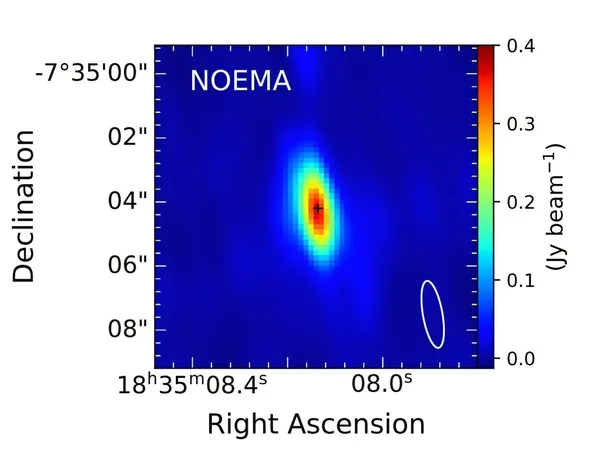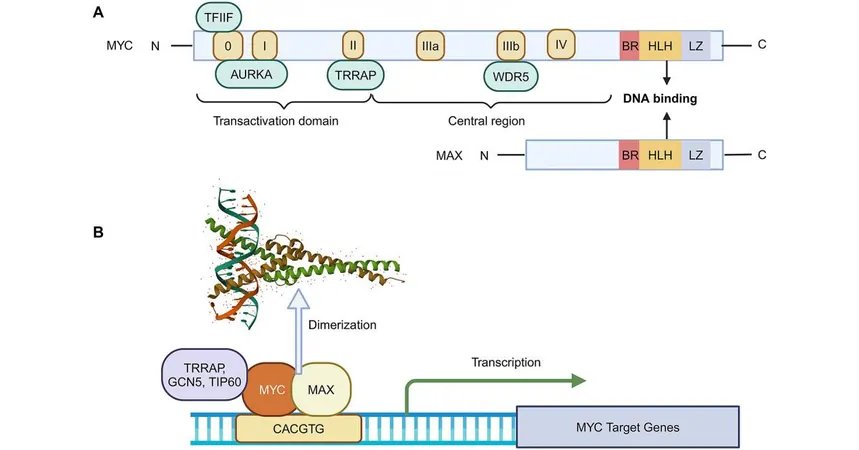
Could Targeting the MCJ Protein Unlock the Key to Combating Global Obesity?
2025-01-13
Author: Mei
Introduction to the Obesity Crisis
Obesity is a looming crisis that impacts a staggering 650 million individuals around the globe, contributing significantly to the rise of cardiometabolic diseases and increasing cancer risks. Recent groundbreaking research led by Guadalupe Sabio and Cintia Folgueira from esteemed institutions such as the National Cancer Research Center (CNIO) and the National Center for Cardiovascular Research (CNIC) unveils a powerful mechanism through which our bodies can effectively 'burn' brown fat to generate heat, aiding in the prevention of obesity and its related ailments.
The Role of the MCJ Protein
At the heart of this discovery is a protein known as MCJ, located in the mitochondria—the powerhouse of our cells responsible for energy production. The research team observed remarkable results when they removed the MCJ protein from obese mice, leading to an increase in heat production and significant weight loss. Astonishingly, transplanting fat devoid of this protein into the same mice also resulted in weight reduction, highlighting MCJ's pivotal role in managing body fat.
Understanding Brown Fat's Role in Obesity
Obesity arises mainly from excessive caloric intake or insufficient energy expenditure. Fat tissue, often seen merely as a storage unit for excess calories, actually plays an intricate role in regulating our metabolism. The authors elaborate in their publication in Nature Communications, emphasizing that differentiating between white and brown adipose tissues is crucial. While white fat predominantly stores energy, brown fat is abundant in mitochondria and is essential for thermogenesis—the process that produces heat and helps maintain body temperature in response to cold.
Dr. Sabio notes, 'For some time, researchers suspected that stimulating brown fat could be a preventive measure against obesity. Understanding the mechanisms at play is our top priority.'
Revolutionary Insights into Heat Generation
Past beliefs suggested that brown fat activated heat production via a singular method, yet discoveries from Sabio and Folgueira’s team reveal multiple pathways involved, particularly one regulated by the MCJ protein. The implications are enormous; by targeting and potentially inhibiting MCJ, it may be possible to combat obesity effectively.
Remarkably, the study demonstrated that fat devoid of MCJ not only promotes heat production but also shields the animals from health complications typically linked to obesity, such as type 2 diabetes and elevated lipid levels. Beatriz Cicuéndez, a key author of the study, explains that the protective effects stem from the activation of a critical catabolic signaling pathway that enhances the utilization of fats, sugars, and proteins for heat generation—similar mechanisms observed in individuals with highly active brown fat.
Next Steps: Therapeutic Developments
The research team is now focused on developing therapeutic strategies to inhibit the MCJ protein in obese patients. However, they recognize the importance of investigating the protein’s functions in other tissues before pursuing clinical applications.
Dr. Sabio also emphasizes the broader implications of their research, stating, 'We aim to explore how these changes in fat may influence tumor growth or cachexia, which is often associated with cancer.'
Conclusion
As obesity rates continue to climb, this newfound understanding of the MCJ protein and its role in brown fat thermogenesis could open doors to groundbreaking treatments. An impending revolution in obesity management may be on the horizon—could this be the breakthrough the world has been waiting for? Stay tuned as we await more developments from this promising research!



 Brasil (PT)
Brasil (PT)
 Canada (EN)
Canada (EN)
 Chile (ES)
Chile (ES)
 Česko (CS)
Česko (CS)
 대한민국 (KO)
대한민국 (KO)
 España (ES)
España (ES)
 France (FR)
France (FR)
 Hong Kong (EN)
Hong Kong (EN)
 Italia (IT)
Italia (IT)
 日本 (JA)
日本 (JA)
 Magyarország (HU)
Magyarország (HU)
 Norge (NO)
Norge (NO)
 Polska (PL)
Polska (PL)
 Schweiz (DE)
Schweiz (DE)
 Singapore (EN)
Singapore (EN)
 Sverige (SV)
Sverige (SV)
 Suomi (FI)
Suomi (FI)
 Türkiye (TR)
Türkiye (TR)
 الإمارات العربية المتحدة (AR)
الإمارات العربية المتحدة (AR)